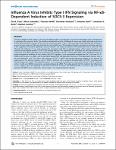Influenza A Virus Inhibits Type I IFN Signaling via NF-κB-Dependent Induction of SOCS-3 Expression
Pauli, Eva-K.
Schmolke, Mirko
Wolff, Thorsten
Viemann, Dorothee
Roth, Johannes
Bode, Johannes G.
Ludwig, Stephan
The type I interferon (IFN) system is a first line of defense against viral infections. Viruses have developed various mechanisms to counteract this response. So far, the interferon antagonistic activity of influenza A viruses was mainly observed on the level of IFNbeta gene induction via action of the viral non-structural protein 1 (NS1). Here we present data indicating that influenza A viruses not only suppress IFNbeta gene induction but also inhibit type I IFN signaling through a mechanism involving induction of the suppressor of cytokine signaling-3 (SOCS-3) protein. Our study was based on the observation that in cells that were infected with influenza A virus and subsequently stimulated with IFNalpha/beta, phosphorylation of the signal transducer and activator of transcription protein 1 (STAT1) was strongly reduced. This impaired STAT1 activation was not due to the action of viral proteins but rather appeared to be induced by accumulation of viral 5' triphosphate RNA in the cell. SOCS proteins are potent endogenous inhibitors of Janus kinase (JAK)/STAT signaling. Closer examination revealed that SOCS-3 but not SOCS-1 mRNA levels increase in an RNA- and nuclear factor kappa B (NF-kappaB)-dependent but type I IFN-independent manner early in the viral replication cycle. This direct viral induction of SOCS-3 mRNA and protein expression appears to be relevant for suppression of the antiviral response since in SOCS-3 deficient cells a sustained phosphorylation of STAT1 correlated with elevated expression of type I IFN-dependent genes. As a consequence, progeny virus titers were reduced in SOCS-3 deficient cells or in cells were SOCS-3 expression was knocked-down by siRNA. These data provide the first evidence that influenza A viruses suppress type I IFN signaling on the level of JAK/STAT activation. The inhibitory effect is at least in part due to the induction of SOCS-3 gene expression, which results in an impaired antiviral response.
No license information

